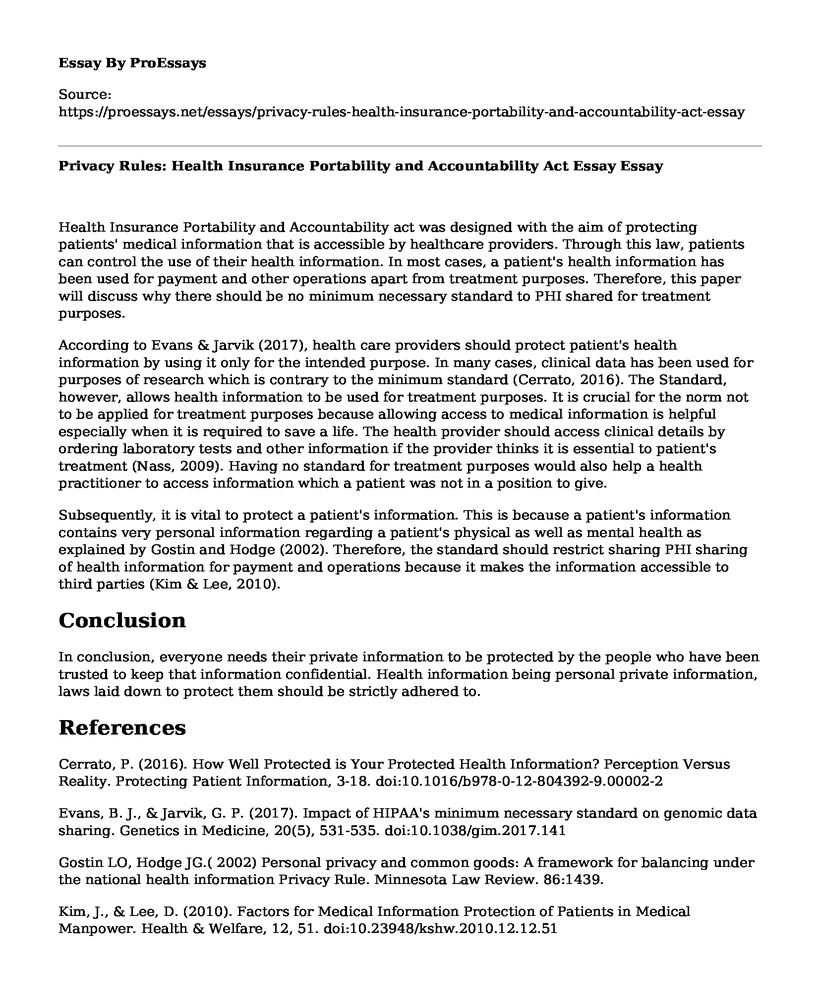Health Insurance Portability and Accountability act was designed with the aim of protecting patients' medical information that is accessible by healthcare providers. Through this law, patients can control the use of their health information. In most cases, a patient's health information has been used for payment and other operations apart from treatment purposes. Therefore, this paper will discuss why there should be no minimum necessary standard to PHI shared for treatment purposes.
According to Evans & Jarvik (2017), health care providers should protect patient's health information by using it only for the intended purpose. In many cases, clinical data has been used for purposes of research which is contrary to the minimum standard (Cerrato, 2016). The Standard, however, allows health information to be used for treatment purposes. It is crucial for the norm not to be applied for treatment purposes because allowing access to medical information is helpful especially when it is required to save a life. The health provider should access clinical details by ordering laboratory tests and other information if the provider thinks it is essential to patient's treatment (Nass, 2009). Having no standard for treatment purposes would also help a health practitioner to access information which a patient was not in a position to give.
Subsequently, it is vital to protect a patient's information. This is because a patient's information contains very personal information regarding a patient's physical as well as mental health as explained by Gostin and Hodge (2002). Therefore, the standard should restrict sharing PHI sharing of health information for payment and operations because it makes the information accessible to third parties (Kim & Lee, 2010).
Conclusion
In conclusion, everyone needs their private information to be protected by the people who have been trusted to keep that information confidential. Health information being personal private information, laws laid down to protect them should be strictly adhered to.
References
Cerrato, P. (2016). How Well Protected is Your Protected Health Information? Perception Versus Reality. Protecting Patient Information, 3-18. doi:10.1016/b978-0-12-804392-9.00002-2
Evans, B. J., & Jarvik, G. P. (2017). Impact of HIPAA's minimum necessary standard on genomic data sharing. Genetics in Medicine, 20(5), 531-535. doi:10.1038/gim.2017.141
Gostin LO, Hodge JG.( 2002) Personal privacy and common goods: A framework for balancing under the national health information Privacy Rule. Minnesota Law Review. 86:1439.
Kim, J., & Lee, D. (2010). Factors for Medical Information Protection of Patients in Medical Manpower. Health & Welfare, 12, 51. doi:10.23948/kshw.2010.12.12.51
Nass, S. J. (2009, January 01). Beyond the HIPAA Privacy Rule: Enhancing Privacy, Improving Health Through Research. Retrieved from https://www.ncbi.nlm.nih.gov/books/NBK9573/
Cite this page
Privacy Rules: Health Insurance Portability and Accountability Act Essay. (2022, Jul 20). Retrieved from https://proessays.net/essays/privacy-rules-health-insurance-portability-and-accountability-act-essay
If you are the original author of this essay and no longer wish to have it published on the ProEssays website, please click below to request its removal:
- Film Analysis Essay on Still Alice: The Theme of Alzheimer's Disorder
- The 2010 IOM Report on Nursing's Future and Its Impact Paper Example
- The Magnetic Resonance Imaging Essay Example
- Essay Sample on Justice in States and Souls: Plato's Stance
- Bill of Rights: Protecting Human Rights and Dignity - Essay Sample
- Health: Maintaining a Healthy Lifestyle - Essay Example
- Hate Crime Laws Paper Example







